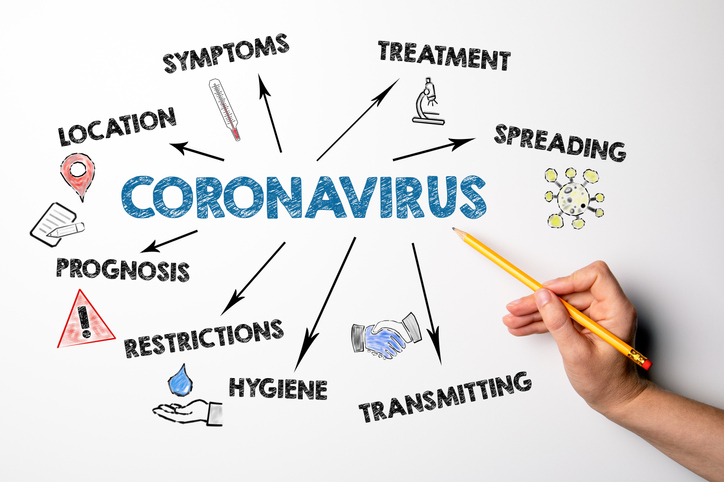Every day, we are hearing the tally of confirmed cases of coronavirus (covid-19) grow and grow. There are now more than 100,000 cases around the globe, with over 80,000 of those in China, where the virus began.
With the news full of nothing else, events being canceled around the country and an $8.4 billion emergency spending bill just approved by our government, it might seem like the right thing to do is quarantine ourselves until July.
But is it?
Dr. Alzein is here to explain what the coronavirus really is, why the alarms are being sounded, how it’s transmitted and how to prevent contracting it.
What is coronavirus?
Coronavirus is actually the name of a large group of viruses that usually cause mild, cold-like illnesses. However, every so often, a virus in this family with the potential to impact the entire globe with serious health consequences for a huge number of people will evolve, such as SARS and MERS. This new strain, covid-19, causes flu-like symptoms; fever, coughing and shortness of breath.
The vast majority of covid-19 cases will be mild and have no lasting effect. They won’t require hospitalization or special treatment beyond supportive care to manage symptoms, and they may not even be diagnosed as covid-19 at all.
That doesn’t sound so bad. Why all the panic?
Just like with the flu, seniors and those with chronic medical conditions who contract covid-19 are at risk of severe respiratory complications that cause death. However, unlike the flu, there is no vaccine and no cure for covid-19, so there is no way to protect the elderly and medically fragile from this disease and its deadly complications.
How would we contract covid-19?
Infected persons are contagious before they show symptoms and experts believe it could take anywhere from 2 days to 2 weeks to show symptoms. That’s 14 days of contaminating people on public transportation, at work, at school, at houses of worship – everywhere they go! The virus is spread through microscopic droplets transmitted through:
• Coughing or sneezing by an infected person
• Touching a surface that has been contaminated with the droplets and then touching your mouth, nose or eyes
• Close personal contact with an infected person
What about my kids?
Unlike the flu earlier this season, children are not at any more risk of covid-19 than adults, and in fact, most confirmed cases of covid-19 are in adults.
How do we prevent getting covid-19?
While Chicago does have confirmed covid-19 cases, our area is still a low-risk region. Prevent covid-19 by avoiding those who have traveled internationally, especially to China, Italy, Iran, Japan or South Korea and by following these guidelines:
• Wash hands with soap and water or an alcohol-based sanitizer frequently and for at least 20 seconds.
• Don’t touch the nose, mouth or eyes.
• Avoid people who are sick.
• Stay home from school, work and daycare when ill.
• Cough or sneeze into the elbow and then wash hands promptly.
• Use alcohol wipes to clean bathrooms, doorknobs, phones and other common area surfaces.
• Reconsider travel plans internationally, to areas of concern or to high risk regions.
What else can I do?
Make sure your child has received a flu vaccine this season. Protecting your child from the flu helps keep them healthy and better able to fight covid-19 in case they do contract it. As a matter of fact, this advice is helpful for all the adults in your family too.
I think my child might have covid-19. What should I do?
Do not come to our offices or Urgent Care. Do not take your child into a public place. Keep them isolated away from seniors and those with chronic medical conditions. Call us at 708-424-7600 and we’ll give you instructions on how to proceed with testing, diagnosis, and treatment.
I still have questions!
Follow us on Facebook, Twitter, or Instagram. We’ll be posting information and updates as it becomes available to keep all our patient families safe and healthy. Want to talk to someone at the office? Call us at 708-424-7600 or visit Our Evergreen Park, Oak Lawn/95th Street, and Urgent Care locations and we’ll be happy to personally answer your questions.
When we all practice good hygiene and contamination prevention, covid-19 should end quickly, with all of us healthy, safe, and ready for a beautiful summer!


